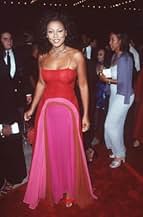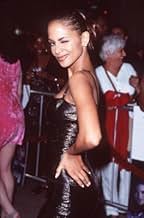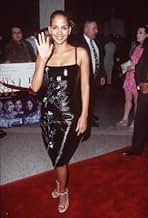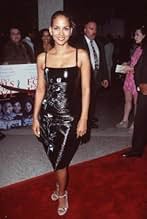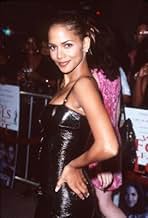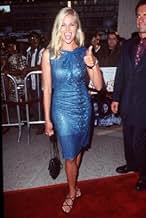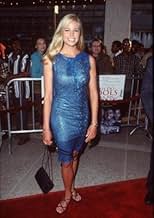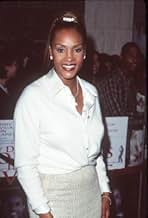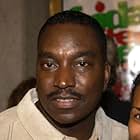IMDb RATING
6.4/10
4.7K
YOUR RATING
Three women each claim to be the widow of 1950s doo-wop singer Frankie Lymon, claiming legal rights to his estate.Three women each claim to be the widow of 1950s doo-wop singer Frankie Lymon, claiming legal rights to his estate.Three women each claim to be the widow of 1950s doo-wop singer Frankie Lymon, claiming legal rights to his estate.
- Awards
- 2 wins & 4 nominations total
Miguel A. Núñez Jr.
- Young Little Richard
- (as Miguel A. Nunez Jr.)
- Director
- Writer
- All cast & crew
- Production, box office & more at IMDbPro
Featured reviews
It was true in the '50s and still is today: it's no exaggeration to state that most hitmaking careers are over in 18 months. Teen idols fare the worst, and such was the fate of Frankie Lymon, who scored but three Top 20 hits between February 1956 and the summer of 1957: "Why Do Fools Fall In Love," "I Want You To Be My Girl" (both with The Teenagers) and "Goody Goody" (as a soloist). After that, the industry and music buyers considered him to be yesterday's former fresh face. And, like most young teens who become overnight sensations, Frankie's firework-long popularity came to cripple him later as a) people would not accept him as anything other than a 13-year-old and b) he was utterly unprepared to cope with real life once his flash of fame had ended. An insightful peek into Frankie Lymon's mercurial life would have made a great movie -- but this isn't it. Instead, we get only a superficial look at Lymon, as the movie focuses instead on the three women who claimed to be his wife. Lymon does not deserve to be shoved into the background of his own biopic, especially as his story is representative of the rise and fall of many flash-in-the-pan artists who find themselves revered by the public one minute and then dumped into history's ashcan the next -- often before they really reach the summit of their skills. (Believe me -- as the writer of "The History Of Rock 'n' Roll," I know this all too well.) The three women battling over his estate were more a footnote to his story than the real drama and far too much time is allocated to letting the three female leads each take a star turn. Yes, Zola Taylor was the best-known of the three, but she is portrayed following her run with The Platters as an in-the-money solo star headlining live shows with her giant hit "Only You." Are the producers kidding? Zola Taylor didn't even JOIN The Platters until AFTER "Only You" had become a million-seller! The Platters scored big as the most successful hitmaking singing group of the late '50s (1955-9), despite the fact that the "group" was really lead vocalist Tony Williams -- with the others as mere background singers. (What were The Doors, for example, without Jim Morrison?) Zola only sang lead on a couple of minor Platters chart items -- and after leaving the act, immediately sank into near total obscurity. The Platters' golden era ended in 1960 after Tony left on his ill-fated solo career. (I explored this in great detail while assembling a 60-track Platters career retrospective 3-CD box set.) None of The Platters really made much money at all -- as they were mere salaried employees of their manager, Buck Ram. Ram wrote much of their material, told them what to sing and how, produced their records, owned The Platters' name and (no surprise) kept nearly all of the loot himself. The portrayal of Morris Levy, who owned several labels including Gee (the recording home of Lymon and The Teenagers) was pretty accurate. Not all record labels screwed artists as thoroughly as Levy's did, but his methods were none too unusual for the time. In fact, they're not much different than what the industry does today!
WHY DO FOOLS FALL IN LOVE? is a supremely entertaining biopic of the young singer Frankie Lyman, which unfolds in a clever variation on the traditional flashback form of storytelling. The film opens with three women arriving at Frankie's former manager's office after his death, trying to claim his estate, all claiming to be the legal widow of Lyman and it is during the trial to determine which of these ladies is Lyman's legal widow where Frankie's story unfolds. As with all movie biographies, you never know how much you're watching is based on fact and what has been enhanced or diluted for dramatic effect. In this screenplay, Frankie is a charismatic young singer, who apparently had no problem charming women out of their clothes and their money, the latter of which apparently went to support his drug habit. Frankie's drug use is somewhat glossed over and the screenplay tends to concentrate more on Frankie's manipulative ways with these three women and how he, at one time or another, managed to convince all three of them that there were the only women in the world. Baby-faced Larenz Tate plays Frankie with a sincerity and sexiness that possibly oversells Frankie's real womanizing, but he manages to keep Frankie likable despite some of the slimy things he does. The three women in Frankie's life are well played by Halle Berry, Viveca A. Fox, and Lela Rochon, with Fox a standout in probably the best performance of her career. The musical sequences are troublesome...Tate works hard at lip-syncing authentically, but I never bought the lip-syncing in the film...all of the musical sequences in the film come off sounding "canned." Still, Tate and the ladies commit to their roles and do make the movie worth watching. I don't know how accurate the film is as a biography of Frankie Lyman, but it is a very entertaining film that will effortlessly hold interest.
"Why Do Fools Fall in Love" is somewhat flawed and takes quite a lot of artistic liberties, but it's always fun to watch. Larenz Tate isn't entirely convincing as Frankie Lymon--I guess they just cast him because he's real short. The concert scenes and TV appearances where he sings are noticeably lip-synched and look pretty cheesy. But acting-wise Tate did a fine job. Obviously, they didn't really delve into his drug addiction, to keep with its light-hearted feel. So we don't get to experience the heavy drama of Lymon's short life. The actresses were good--Halle Berry, Vivica A. Fox and Lela Rochon. Their performances were equally effective and amusing. The great Little Richard has some spirited cameos. He definitely brought the mood of the film to an all-time high. I just wish he could've been in it for longer than 10 minutes. The whole movie basically concentrates on the romantic-comedy portions of Lymon's life--some true, some fabricated. There were some dramatic moments, but they occur mostly towards the end. But I got a lot of laughs and the film just has a fitfully satisfying upbeat tone. Of course, I LOVED the music. I have to admit that was one of the main reasons I enjoyed it so much.
"Why Do Fools Fall in Love" is a moderately loose portrayal of Lymon's life, but it makes great entertainment.
"Why Do Fools Fall in Love" is a moderately loose portrayal of Lymon's life, but it makes great entertainment.
Other commentators seem to feel this is, or should have been, a movie about the life of Frankie Lyman. However, as the title indicates, it is really about three women who fell in love ... with a guy named Frankie Lyman. As the movie brings home fairly early, there is not much about Frankie to love. He is portrayed as a shallow, self-centered fool, with as little understanding of the music business as of the women he scams into being his wives.
Did Frankie have raw talent? Of course he did. Did Frankie do anything to develop this raw talent into an enduring musical career? No evidence of that. So much for Frankie. Larenz Tate plays him fairly well on stage, and rather flat off stage. We are not given a clue as to what the attraction may have been.
And, since two of the women were relatively unaware of his celebrity status when they were first taken with him, and the third had a celebrity status of her own, we expect the movie to answer the title question. The women do not entirely succeed in this, but they are terrifically watchable while they try.
Halle Berry is great as Zola Taylor, singer with the Platters. Viveca Fox is almost as good as the home girl who turns hooker to support Frankie, and Lela Rachon is perfect as the goodie-two-shoes last wife, a God-fearing and educated working woman.
The music scenes are good, and the courtroom scenes are outrageously unrealistic.
This would have been a better movie if they had not specifically based the story on Lyman, but only alluded to him. In this manner, the Hollywoodization of the story would have been less noticeable. Unfortunately, realizing that such a course would inevitably preclude using the Lyman hits, they chose to make this a triography of the wives, and allow them to play off Tate's weak Lyman persona.
All in all, a good couple of hours of enjoyment that is not too compelling. When it was over, we found ourselves asking, "Why DID these three fools fall in love?"
Did Frankie have raw talent? Of course he did. Did Frankie do anything to develop this raw talent into an enduring musical career? No evidence of that. So much for Frankie. Larenz Tate plays him fairly well on stage, and rather flat off stage. We are not given a clue as to what the attraction may have been.
And, since two of the women were relatively unaware of his celebrity status when they were first taken with him, and the third had a celebrity status of her own, we expect the movie to answer the title question. The women do not entirely succeed in this, but they are terrifically watchable while they try.
Halle Berry is great as Zola Taylor, singer with the Platters. Viveca Fox is almost as good as the home girl who turns hooker to support Frankie, and Lela Rachon is perfect as the goodie-two-shoes last wife, a God-fearing and educated working woman.
The music scenes are good, and the courtroom scenes are outrageously unrealistic.
This would have been a better movie if they had not specifically based the story on Lyman, but only alluded to him. In this manner, the Hollywoodization of the story would have been less noticeable. Unfortunately, realizing that such a course would inevitably preclude using the Lyman hits, they chose to make this a triography of the wives, and allow them to play off Tate's weak Lyman persona.
All in all, a good couple of hours of enjoyment that is not too compelling. When it was over, we found ourselves asking, "Why DID these three fools fall in love?"
An interesting (but flawed account) of the battle over pop star Frankie Lymon's estate by three women claiming to be his widow...
The story portrayed here is actually semi-fictitious, but the background story of Frankie's life is entirely true.
From his starts as a fresh-faced Harlem kid to a haunted drug addict, Larenz Tate (one of the most underrated talents in Hollywood) shines as dreamer Frankie, and does well to give perspective to Frankie's conflicting attitudes towards his relationships with the women, which the script muddles- Frankie appears shallow yet introspective at the same time.
Halle Berry tries to make more of her understated and thin role as Zola Taylor, wifey no. 2, but provides an adequate performance.
The most developed of the three female characters, is Elizabeth Waters (Viveca A. Fox). Loyal yet dishonest, gritty Elizabeth is the only character aside from Frankie that seems to be real. This is a combined effort by the characterisation and the performance by Fox.
And Lela Rochon does very well cast against type, as a school marm dragged into this battle. Rochon clearly understands the character well, and manages to make her mark on the story despite being developed late into the film.
The period detail of this piece is well captured over the 20-odd years that this story is set (particularly the performances of Frankie with the Teenagers), and even the small scenes which provide insight into Frankie's younger days.
The main flaws of this film lie essentially in the struggle to develop some of the themes. As mentioned earlier, Frankie's reasons for bigamy are not established at all or how he copes this with this, or whether one of the wives in particular is lying about the legitimacy of her marriage.
Some of the characterisation is a bit thin, caused by some of the later events of the film and because this deep story of fame, loss, betrayal and torment has such a muddled structure the whole film comes across as sketchy by the end which clearly was not intended.
But never the less this is an adequate tribute, to the world of fame and its inevitable clingers-on, and those just caught up in the action. This will never be top of its genre however...
The story portrayed here is actually semi-fictitious, but the background story of Frankie's life is entirely true.
From his starts as a fresh-faced Harlem kid to a haunted drug addict, Larenz Tate (one of the most underrated talents in Hollywood) shines as dreamer Frankie, and does well to give perspective to Frankie's conflicting attitudes towards his relationships with the women, which the script muddles- Frankie appears shallow yet introspective at the same time.
Halle Berry tries to make more of her understated and thin role as Zola Taylor, wifey no. 2, but provides an adequate performance.
The most developed of the three female characters, is Elizabeth Waters (Viveca A. Fox). Loyal yet dishonest, gritty Elizabeth is the only character aside from Frankie that seems to be real. This is a combined effort by the characterisation and the performance by Fox.
And Lela Rochon does very well cast against type, as a school marm dragged into this battle. Rochon clearly understands the character well, and manages to make her mark on the story despite being developed late into the film.
The period detail of this piece is well captured over the 20-odd years that this story is set (particularly the performances of Frankie with the Teenagers), and even the small scenes which provide insight into Frankie's younger days.
The main flaws of this film lie essentially in the struggle to develop some of the themes. As mentioned earlier, Frankie's reasons for bigamy are not established at all or how he copes this with this, or whether one of the wives in particular is lying about the legitimacy of her marriage.
Some of the characterisation is a bit thin, caused by some of the later events of the film and because this deep story of fame, loss, betrayal and torment has such a muddled structure the whole film comes across as sketchy by the end which clearly was not intended.
But never the less this is an adequate tribute, to the world of fame and its inevitable clingers-on, and those just caught up in the action. This will never be top of its genre however...
Storyline
Did you know
- TriviaWhen Tina Andrews wrote the original script, the part of Frankie Lymon was first offered to Michael Jackson.
- GoofsWhen the scenes changes to Lamberton Prison in 1985, Diana Ross' version of "Why Do Fools" is more than once referred to as a new hit, when in fact, it was released in 1981.
- Quotes
Emira Eagle: Maybe there were three separate Frankies, and each of us got a piece.
- SoundtracksWhy Do Fools Fall in Love
Written by Frankie Lymon and Morris Levy
Performed by Frankie Lymon and the Teenagers
Courtesy of Rhino Entertainment Company/EMI Records UK Ltd.
- How long is Why Do Fools Fall in Love?Powered by Alexa
Details
Box office
- Gross US & Canada
- $12,461,773
- Opening weekend US & Canada
- $3,946,382
- Aug 30, 1998
- Gross worldwide
- $12,461,773
- Runtime1 hour 56 minutes
- Sound mix
- Aspect ratio
- 1.85 : 1
Contribute to this page
Suggest an edit or add missing content

Top Gap
By what name was Why Do Fools Fall in Love (1998) officially released in Canada in English?
Answer

